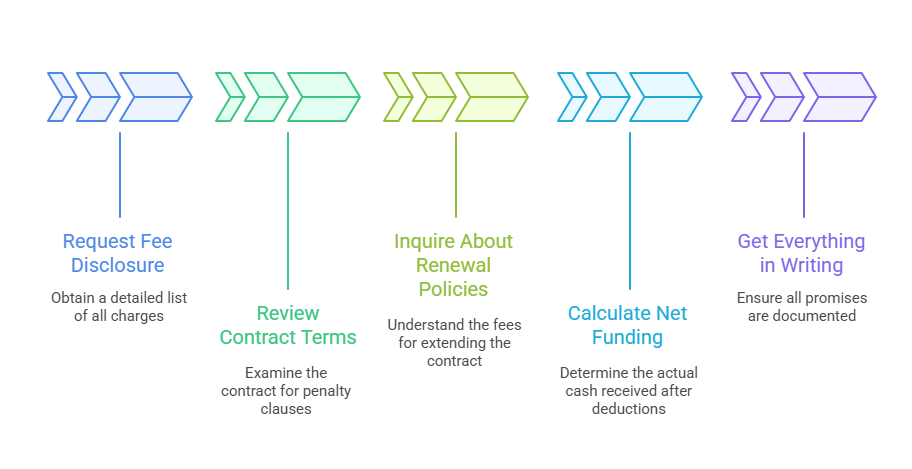When cash flow gets tight, merchant cash advances might seem like a quick solution. You get funds fast, and repayments come automatically from your daily sales. But here's what many business owners don't realize until it's too late: the advertised factor rate is just the tip of the iceberg.
Hidden costs in merchant cash advances can turn what looks like affordable financing into a financial nightmare. These buried fees and charges often increase your effective rate significantly, sometimes doubling or even tripling the true cost of your funding. Understanding these hidden expenses isn't just smart business, it's essential for your company's survival.
Common Administrative Fees That Drain Your Budget
Administrative fees represent one of the most widespread hidden costs in merchant cash advances that can catch business owners off guard. These charges often get buried deep in contract language, making them easy to overlook during the application process.
- Processing and underwriting fees that can range from hundreds to thousands of dollars upfront
- Document preparation charges for contract creation and legal paperwork
- Account maintenance costs that get deducted monthly throughout your advance term
- Wire transfer fees for funding delivery that reduce your actual advance amount
Many lenders present these administrative fees as standard costs of doing business, but they can add up quickly. A $50,000 advance might come with $2,000 in various administrative charges, effectively reducing your funding while keeping your repayment obligations the same.
Application and Origination Charges You Need to Know

Application and origination charges represent another layer of hidden costs in merchant cash advances that can significantly impact your financing expenses. These upfront fees often get deducted from your advance amount, meaning you receive less cash while still owing the full repayment.
- Credit check and verification fees for reviewing your business and personal credit history
- Bank statement analysis charges for evaluating your cash flow and sales patterns
- Risk assessment fees that cover the lender's evaluation of your business stability
- Broker commissions when third-party companies facilitate your advance approval
These charges typically get presented as necessary costs for processing your application, but they can easily add 3-5% to your total financing expense. Smart business owners always ask for a complete breakdown of all upfront costs before signing any advance agreement.
Renewal and Extension Fee Traps
Renewal and extension fee traps create some of the most expensive hidden costs in merchant cash advances, especially when businesses struggle with repayment schedules. These charges can turn temporary funding into long-term financial burdens.
- Rollover fees when you can't complete payments on schedule and need to extend terms
- Restructuring charges for modifying payment amounts or schedules mid-contract
- Default penalties that kick in when daily collections fall below minimum thresholds
- New application fees for refinancing existing advances with additional funding
The renewal cycle often becomes a trap where businesses pay thousands in fees just to maintain their current advance, without receiving any additional funding. This pattern can create a debt spiral that's extremely difficult to escape.
How to Calculate Your True Effective Rate
Calculating your true effective rate helps you understand the real cost of merchant cash advances beyond the advertised factor rate. This analysis reveals how hidden fees and charges impact your total financing expense.
- Add all upfront fees to your total repayment amount, including administrative charges, processing fees, and any broker commissions
- Subtract all deducted costs from your advance amount to determine how much cash you actually receive for business use
- Calculate your payment term in days based on your estimated daily sales volume and collection percentage
- Apply the APR formula using your actual received amount versus total repayment including all fees over your estimated term length
- Compare the result to traditional financing options to evaluate whether the advance makes financial sense for your situation
This calculation often reveals effective rates that are significantly higher than what the factor rate suggests, sometimes reaching 50-100% APR or more when hidden costs are included.
Steps to Identify Hidden Charges Before Signing

Identifying hidden charges before signing protects your business from unexpected costs and helps you make informed financing decisions. A systematic approach to contract review can save thousands in surprise fees.
- Request a complete fee disclosure that itemizes every charge, including processing, administrative, and third-party costs
- Review the contract terms section carefully for penalty clauses, default provisions, and additional charge triggers
- Ask about renewal policies and what fees apply if you need to extend or modify your advance agreement
- Calculate your net funding amount after all upfront deductions to understand exactly how much cash you'll receive
- Get everything in writing before signing, including verbal promises about fee waivers or rate reductions
Taking time for thorough due diligence might slow down your funding process, but it protects your business from costly surprises that could damage your financial stability long-term.
Making Informed Decisions About Alternative Funding
Making informed decisions about alternative funding requires understanding both the visible and hidden costs in merchant cash advances compared to other financing options. When you factor in all fees and charges, traditional financing might offer better value despite longer approval times.
Consider exploring business credit lines, equipment financing, or revenue-based funding that offers more transparent pricing structures. These alternatives might take longer to secure, but they often provide clearer terms and lower effective rates when you need working capital.
The key is matching your financing choice to your actual cash flow needs and repayment capacity. Sometimes the convenience of fast funding comes at a cost that outweighs the benefits, especially when hidden fees push your effective rate into triple digits.
Hidden costs in merchant cash advances can transform seemingly affordable funding into expensive debt that threatens your business's financial health. By understanding common fee structures, calculating true effective rates, and conducting thorough due diligence, you can avoid costly surprises and make better financing decisions.
Remember that transparency in funding should be a non-negotiable requirement when evaluating any advance offer. Legitimate lenders will provide complete fee disclosures and answer all your questions about contract terms without pressure or evasion.
When cash flow challenges arise, take time to explore all your options. The fastest funding isn't always the best funding, especially when hidden charges can cost your business thousands more than expected. Smart financing decisions today protect your company's profitability and growth potential tomorrow.

.png)






